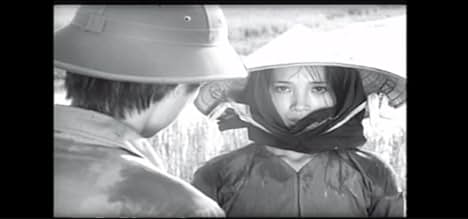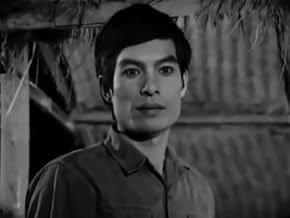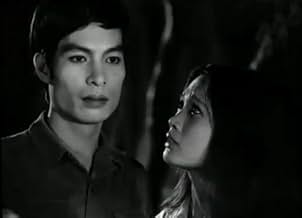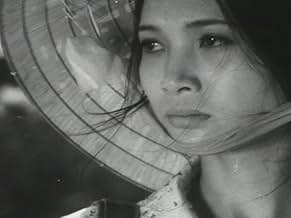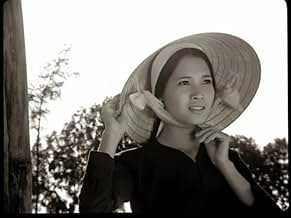IMDb RATING
7.6/10
679
YOUR RATING
Duyen faces a daily struggle to care for her young son and her weakened father-in-law, while keeping secret the fact that her husband died in a battle during the war.Duyen faces a daily struggle to care for her young son and her weakened father-in-law, while keeping secret the fact that her husband died in a battle during the war.Duyen faces a daily struggle to care for her young son and her weakened father-in-law, while keeping secret the fact that her husband died in a battle during the war.
- Awards
- 1 win & 2 nominations total
- Director
- Writer
- All cast & crew
- Production, box office & more at IMDbPro
7.6679
1
2
3
4
5
6
7
8
9
10
Featured reviews
This movie had my tears
As simple it could be, the movie took my tears in the last scenes. Somehow I could feel the bitterness and the extreme heartbroken feeling when the father touched the soldier's gun whom he believed his son. To understand that faith has extreme power to heal, though illusive it had to be. Dang Nhat Minh described war with a sensible point of view. Father, mother, wife and kids are the most vulnerable when it comes to war. They suffer the pain, a kid became brave and a wife said white liar. The painting of the countryside of Vietnam was well described, with sincere farmers. Just listen to their conversations, they are REAL. I believe every Vietnamese have lived those dialogs, simple but nothing more than caring and faithful.
Packs a punch
"But why are you still alive?"
This is a war film, but it's one about the human cost to those waiting at home while loved ones go off to fight, not actual combat. In it, a young woman (Le Van) harbors a secret from her family - she knows that her husband was killed about a year ago. She keeps up the ruse by having a man she's met on a ferry write letters as if he were him, but eventually the two begin having feelings for one another. There is a fair dose of melodrama in the story set to soaring, emotional music, and it's effective at making one feel the national sorrow for millions over decades of brutal fighting. In the quote above, uttered by the innocent boy to a comrade of his dead father's, followed by the man's look of wild grief, the film also captures a sense of survivor's guilt in a deeply moving way.
Le Van is brilliant at conveying the angst of her situation and the profound isolation of keeping her secret. She's also wonderful in performing the cheo (a traditional Vietnamese theatrical opera) in the middle of the film, one which mirrored her character's life. In an earlier scene there is mention of the government selecting their village as one that will be involved with the "adoption movement for martyr families," meaning that if they've lost a son in war, another young man will "become their son" as a pragmatic replacement, a parallel to her possibly replacing her husband. Similarly, when her husband's comrade in arms appears at his father's deathbed and gives the old man comfort by pretending to be his son, we get the feeling of a desperate salve to lives lost, and people carrying on as best they can.
Throughout the film there is beautiful cinematography, completely in tune with the emotions of the people in this little village. The long shot of the new man trudging through a rice field, the young woman flying a kite he's made for her son on a hillside, and him taking the ferry across the river when the town begins to suspect a scandal are all fantastic. I also loved the bits of magical realism, like the meeting with the village god, or the market held near a temple held on (lunar) July 15, the traditional day of Tet Trung Nguyen (Ghost Festival), in the middle of the "ghost month," arranged so that living and dead can meet each other.
The film has its focus on those who suffered behind the scenes because of the war, not revolutionary propaganda as in other films, but unfortunately it can't help itself at the very end, when we see flags proudly flying, and the little boy going off to school. Maybe it was necessary as an uplift, an indication that life must go on for the people and the country after countless tragedies, but it felt a little off. Unfortunately, director Dang Nhat Minh had to run the gauntlet with the censors 13 times with this film, who were sensitive to love blossoming with the teacher and to the ghost sequence, and one wonders what this film would have looked like unfettered. Still, very well made, and packs a punch.
This is a war film, but it's one about the human cost to those waiting at home while loved ones go off to fight, not actual combat. In it, a young woman (Le Van) harbors a secret from her family - she knows that her husband was killed about a year ago. She keeps up the ruse by having a man she's met on a ferry write letters as if he were him, but eventually the two begin having feelings for one another. There is a fair dose of melodrama in the story set to soaring, emotional music, and it's effective at making one feel the national sorrow for millions over decades of brutal fighting. In the quote above, uttered by the innocent boy to a comrade of his dead father's, followed by the man's look of wild grief, the film also captures a sense of survivor's guilt in a deeply moving way.
Le Van is brilliant at conveying the angst of her situation and the profound isolation of keeping her secret. She's also wonderful in performing the cheo (a traditional Vietnamese theatrical opera) in the middle of the film, one which mirrored her character's life. In an earlier scene there is mention of the government selecting their village as one that will be involved with the "adoption movement for martyr families," meaning that if they've lost a son in war, another young man will "become their son" as a pragmatic replacement, a parallel to her possibly replacing her husband. Similarly, when her husband's comrade in arms appears at his father's deathbed and gives the old man comfort by pretending to be his son, we get the feeling of a desperate salve to lives lost, and people carrying on as best they can.
Throughout the film there is beautiful cinematography, completely in tune with the emotions of the people in this little village. The long shot of the new man trudging through a rice field, the young woman flying a kite he's made for her son on a hillside, and him taking the ferry across the river when the town begins to suspect a scandal are all fantastic. I also loved the bits of magical realism, like the meeting with the village god, or the market held near a temple held on (lunar) July 15, the traditional day of Tet Trung Nguyen (Ghost Festival), in the middle of the "ghost month," arranged so that living and dead can meet each other.
The film has its focus on those who suffered behind the scenes because of the war, not revolutionary propaganda as in other films, but unfortunately it can't help itself at the very end, when we see flags proudly flying, and the little boy going off to school. Maybe it was necessary as an uplift, an indication that life must go on for the people and the country after countless tragedies, but it felt a little off. Unfortunately, director Dang Nhat Minh had to run the gauntlet with the censors 13 times with this film, who were sensitive to love blossoming with the teacher and to the ghost sequence, and one wonders what this film would have looked like unfettered. Still, very well made, and packs a punch.
Strength of the movie is in its reflecttion of Viet society
"When the Tenth Month Comes" will probably appeal to a very small segment of the movie-watching public. Even foreign film buffs may find this movie simplistic and uninteresting. The strength of the movie lies in it's characterization of traditional pre-Communist values in Vietnam. The protagonist Zuyen who hides her husband's death from the rest of his family, provokes the question: who rightfully owns the memory of the fallen soldier. The film's answer is that it is the family, but not the state that has the right to the memory of the fallen soldier. Zuyen is wrong for hiding her husband's death from her father-in-law, but the rest of the society has no right to his memory, because they did not love him as she and his family did. The film is markedly pro-Confucian and anti-Communist. The English-subtitles for the movie were spotty at best. Non-Vietnamese may miss some of the dialogue, but the message of the movie comes across strongly. Recommended for die-hards and academics.
Watch it to understand more Vietnamese culture !
The legacy of the Vietnam war is described vividly from the real sufferers, not from Hollywood. The theme of this movie is somehow similar to the famous movies " Cranes are Flying" and " Ballad of Soldier" from the former Soviet Unions. Highly recommended.
The greatest Vietnamese movie ever !!
A beautiful, heart touching movie, everyone should watch to know about Vietnamese culture. And Dang Nhat Minh is really a great director, check out his other films.
Details
- Release date
- Country of origin
- Language
- Also known as
- The Love Doesn't Come Back
- Production companies
- See more company credits at IMDbPro
- Runtime
- 1h 25m(85 min)
- Color
- Sound mix
Contribute to this page
Suggest an edit or add missing content

